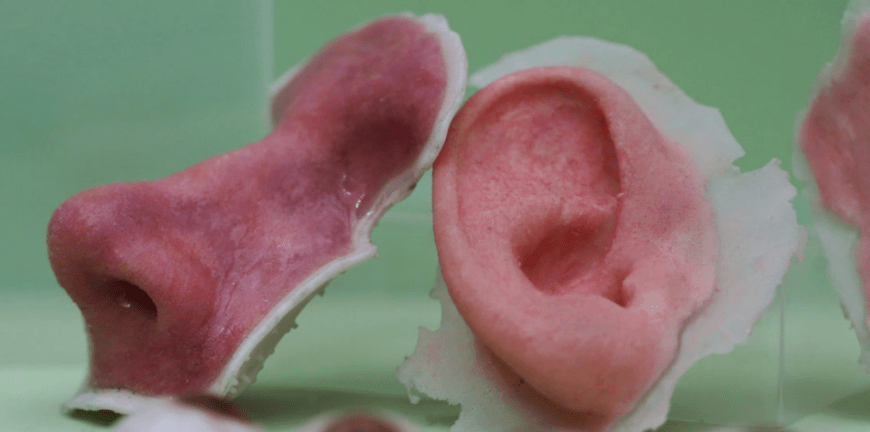Interested in 3D printers but don’t know which one to buy? If you’re looking for a worthy machine, visit Top 3D Shop and check out our 3D printer reviews, we’ll help you choose the machine you need!

Undoubtedly, one of the most promising directions in the development of 3D printing technology is bioprinting. Recently, the media did not stop talking about the world's first 3D-printed liver tissue created by scientists at Organovo. However, much more companies are working in this area that they have undeservedly forgotten. Today we decided to talk about the 11 most significant companies, each of which can revolutionize medicine.
Organovo
Organovo, headquartered in San Diego, California, USA, has dedicated itself to bioprinting from the very beginning. Already, she is making a lot of money by providing pharmaceutical companies with her famous exVive3D ™ liver tissue for drug toxicity tests, and collaborating with beauty and health giants like L’Oréal and Merck. Next year, she plans to launch exVive3D ™ 3D printed kidney tissue on the market. She set an incredible goal - to learn how to create whole organs suitable for implantation.
Cyfuse biomedical
Cyfuse Biomedical is working on its own Regenova bio printer. Just in March of this year, Cyberdyne, a well-known player in the robotics market, invested a large sum of money in Cyfuse Biomedical to support its development. Cyfuse Biomedical scientists have learned how to create three-dimensional structures from cell spheroids using thin needles. Each spheroid is made up of thousands of cells. If you arrange the spheroids in a certain order, they have a tendency to growth and organization. And eventually living tissue forms. Already, the company can create blood vessels, organs of the digestive and urinary systems, cartilage, and even miniature liver. The company's capital is 16.5 million dollars.
Biobots
This young company recently raised more than $ 300,000 on FundersClub crowdfunding platform. To achieve her goals, she took a completely different approach. Instead of printing tissue samples and selling them, she offers inexpensive desktop bioprinters to researchers, pharmaceutical companies, and anyone who wants to get to know the amazing bioprinting technology. Although the printers themselves are relatively inexpensive ($ 25,000), they need to be refilled with special bio-inks worth $ 1,000 per 100 ml. Actually, the company makes the main income on this ink. The principle of operation of BioBots printers is based on the use of special blue light technology, which allows you to quickly irradiate biomaterials without harm to cells.
Aspect Biosystems
The Canadian company Aspect Biosystems was founded in 2013. CEO Konrad Valus says he has already managed to conclude an agreement with a large pharmaceutical company. Now Aspect Biosystems is working on its own bio-printer and is looking for ways to enter the market for new medicines.
3D Bioprinting Solutions
3D Bioprinting Solutions is a leading Russian company in the field of bioprinting, which hopes to discover its own way of manufacturing various human organs. Recently, she managed to make the world's first mouse thyroid gland, which was successfully implanted in an experimental animal. The company has set truly unrealistic goals: it plans to release the world's first 3D-printed kidney by 2018. Her printing technology is based on the collection of stem cells from the patient’s adipose tissue and combining them with a special hydrogel. Upon completion of printing, the hydrogel dissolves, leaving only the cells that form living tissue.
Rokit
A company from South Korea, known for its line of desktop FFF / FDM 3D printers, recently announced that it received a $ 3 million government grant and also plans to enter the 3D bioprinting market. Even if she has no developments to brag about yet, she still has to reckon with 3 million (as it seems to us). In addition, it is supported by the Korea Institute of Science and Technology, the Bundang Hospital at Seoul National University, and the Korean Institute of Engineering and Materials. By 2018, Rokit is planning to finish work on a 3D bio-printer, on which it will be possible to print skin for sunburned people and people with dermatological diseases.
Other companies
There are also many other companies that should be mentioned. Among them are Nano3D, which creates breast cancer tissue for biological research, TeVido Biodevices, which is looking for ways to make nipple tissue for breast plastic surgery, and 3Dynamic Systems, which manufactures various human tissues, including bone and muscle tissue, as well as skin. In addition, there is Modern Meadow, which plans to learn how to print meat products, and the Chinese company MedPrin, which creates a dura mater for brain surgery.